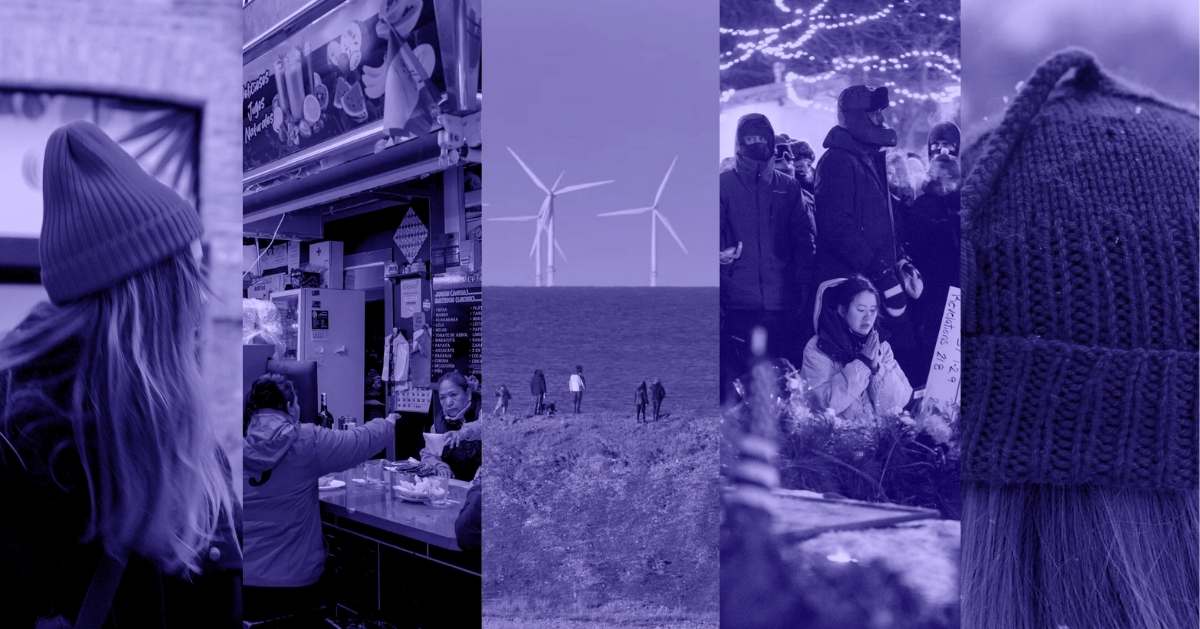Every day the Good Good Good team collects the best good news in the world and shares it with our community. Here are the highlights for this week!
If you want to get good news in your inbox every day, join the Goodnewsletter — the free daily newsletter designed to leave you feeling hopeful.
The Best Positive News We’re Celebrating This Week —
More than 100 volunteers pulled 4,000 pounds of trash and 128 ‘ghost traps’ from Tampa Bay’s waters
Every two years since 2009, Florida wildlife officials implement a 10-day halt to blue crab season in an effort to combat its growing “ghost trap” problem — any crab trap found in open water over those ten days is fair game for cleanup.
This year, on the final day of the pause, a local nonprofit hosted a four-hour cleanup competition that involved 109 volunteers in boats, kayaks, wave runners, and on the beach looking for traps and other trash.
In total, they collected 4,000 pounds of trash and removed 128 “ghost traps” from Tampa Bay waters. Most of the traps had animals stuck inside, which the volunteers freed.
Why is this good news? If left alone and underwater, “ghost traps” contribute to a deadly cycle for marine life: Crabs, fish, and other species are drawn into the trap and, with no way out and no access to food, eventually die and start to decay. That lures in more animals, and the cycle continues.
A professional painter put up an ‘SOS’ on social media to help paint an autism center for free — 50 painters showed up to help
→ Read more (and see photos!)
A new report found solar power is now 41% cheaper than fossil fuels
Fifteen years ago, solar power was nearly four times the cost of fossil fuel alternatives. Now, according to two new United Nations reports, renewable energy has passed a “positive tipping point,” and solar power is now 41% cheaper than fossil fuels.
Alongside the release of the reports, UN Secretary-General Antonio Guterres said, “The fossil fuel age is flailing and failing.” In 2024 alone, green energy outpaced fossil fuel investments by $800 billion.
The reports also shared a 74% growth in electricity generated globally from wind, solar, and other green sources — just in the last year. In that same time frame, 92.5% of all new electricity capacity added to the grid worldwide came from renewables.
London’s iconic Kew Gardens opened a garden focused on the climate crisis and how nature can be used to fight it
In what it says was one of its most ambitious garden projects in recent years, the iconic Kew Gardens in London — which first opened in 1759 — unveiled a new attraction called the Carbon Garden featuring 6,500 new plants and 35 trees.
The garden shows visitors how carbon is crucial in sustaining life on Earth, the scale of the damage caused by the climate crisis and rising global carbon emissions, and how plants and fungi can be “natural allies” in helping restore a healthy balance.
Among other things, the installation includes a feature that displays layers of soil, demonstrating the “hidden world” of carbon underground, and how plants help keep carbon out of the atmosphere.
Why is this good news? While the climate crisis no doubt impacts humans, it also impacts nature — which visitors to the Kew Gardens no doubt care about. It’s been said that “we protect the things we care about,” and this new installation could help inspire more people to take action in their own lives to “ally” with nature and fight climate change.
Doggy-paddling for good: Conservation dogs play an important role in saving endangered platypuses
→ Read more
Thanks to the city’s massive investment, cycling doubled in Paris in just one year
In 2015, then-mayor of Paris Anne Hidalgo first started advancing the city’s cycling plan with a 150 million euro investment that would double the number of cycling lanes and dramatically build out infrastructure. Her vision was to make Paris a “100 percent cycling city.”
And that investment is paying off within a decade. Between October 2022 and October 2023, a study found that the number of people cycling in Paris doubled in a single year. Whether commuting to work or leisurely riding along the Seine, cycling is now a fundamental part of Parisian life.
It wasn’t even because there was necessarily demand for it: the supply of cycling infrastructure came first, and the people flocked to it. And the momentum isn’t slowing down — it’s expanding throughout France.
→ Read more
Scientists found a coral species they thought had gone extinct over two decades ago
Following the 1982-1983 El Niño warming event, a coral endemic to the Galápagos Islands saw sharp population declines and hasn’t been spotted in waters surrounding the islands in 24 years.
Now, a team of biologists has found more than 250 healthy colonies of the species of black stony coral, last officially documented in 2000.
The corals also had budding polyps, suggesting they’re actively reproducing. Thrilled that the species did not disappear entirely, scientists are now looking to understand how it survived.
Why is this good news? Healthy, thriving, growing coral reefs support entire marine ecosystems. Right now, the world is experiencing the fourth global coral bleaching event in recorded history — it’s also the largest, impacting 83.9% of the planet’s coral reefs. Coral surviving warming events is important news to celebrate.
→ Read more
This homeless shelter treats alcoholics with beer and wine — and it’s saving lives
→ Read more
A retired teacher is hiking a 567-mile trail to raise money and awareness for youth mental health
When Clint Hedges retired from teaching math two years ago, he noticed that many students were still struggling with the impacts of the COVID-19 pandemic and had difficulty working through math problems.
Knowing the gaps in mental health support for students, especially in rural communities like his, and that many challenges in life require perseverance, he decided to take on a challenge of his own to help raise money to support students in his former school community.
His challenge: hiking the entire Colorado Trail, a 567-mile route from Jefferson County to Durango, encompassing eight mountain ranges and six wilderness areas.
He set up a GoFundMe to raise money throughout his journey to open a coffee shop that would serve as a gathering place for students, with proceeds going to youth mental health support.
→ Read more
After gray wolves were reintroduced, aspen trees are flourishing in Yellowstone for the first time in 80 years
In January 1995, eight gray wolves were released in Yellowstone National Park, becoming the first wolves to set foot in Wyoming since they had been hunted to the brink of extinction in the 1930s.
In their absence, the area’s natural landscape was obliterated by overgrazing by Rocky Mountain elk. By the 1990s, not a single quaking aspen tree sapling could be found.
While their reintroduction was controversial, ecologists believed their return would restore balance to Yellowstone — and 30 years later, they proved correct. A new report shared evidence of the first new generation of overstory, or mature, aspen trees in Yellowstone’s northern range in 80 years.
Why is this good news? Aspen trees are “a key species for biodiversity,” and as they continue to flourish, the rest of the park benefits, too. They allow filtering light in that creates a habitat supporting a huge diversity of plants, and the larger ecosystem overall.
→ Read more
To keep your brain young, the largest-ever study on cognitive health suggests these 3 changes
→ Read more
Through an online platform, citizen scientists are helping inform real, published scientific research
The citizen science platform iNaturalist was founded in 2008, and as of 2024, it’s collected more than 200 million observations from 3.3 million users. Those submissions go through a “data quality review” to become “research grade” — and are increasingly being used in actual scientific research.
A new study found that since the platform’s founding, observations have been incorporated into more than 5,000 peer-reviewed papers — more than 1,400 in 2022 alone. That’s 10 times as many as five years earlier.
Thanks in large part to smartphones with higher and higher quality cameras, the iNaturalist data has helped scientists identify new species, track invasive species, pinpoint critical habitats, predict climate impacts, study animal behavior, and more.
→ Read more (Gifted link)
New York is the first U.S. state to commit to make new buildings all-electric
Taking a huge leap toward zero-emissions buildings, New York’s Fire Prevention and Building Code Council approved an all-electric building standard, making it the first U.S. state to prohibit gas and other fossil fuels in most new buildings.
The rules go into effect on December 31 of this year and apply to new buildings up to seven stories tall and, for commercial and industrial buildings, up to 100,000 square feet. They go into effect for buildings bigger than that starting in 2029. The council made some exceptions for new buildings that can prove the electric grid can’t accommodate their demand.
The change is likely to lead to a surge in electric heat pump and heat pump water heater installations, which are highly efficient, better for the planet, and easier on people’s pocketbooks.
Why is this good news? Buildings account for 31% of New York’s planet-warming pollution, so while the city also works to electrify existing buildings, keeping new ones fossil fuel-free is incredible progress.
New study: ‘Self-healing’ concrete from Ancient Rome could be the key to future buildings and roads
Solar and batteries make up the vast majority of new power plant installations in the U.S. — and will continue to through 2030
In the first half of 2025, the U.S. added 22,332 megawatts of power plant capacity, the overwhelming majority of which was utility-scale solar, batteries, and onshore wind.
More than half of that total was utility-scale solar with 12,034 megawatts added, battery systems made up 5,900 megawatts, onshore wind with 2,697 megawatts, and natural gas with 1,691 megawatts. The single-largest new addition was built in Texas, a 600-megawatt solar power plant that came online in April.
And while the current presidential administration is attempting to roll back this progress and boost fossil fuels, experts say the momentum we’re seeing now is too strong for major changes. Any renewable energy projects that the administration cancels will only slow things down — not reverse anything.
More good news of the week —
An Indigenous-designed mural doubles as a giant solar power generator, reducing 150 tons of CO2 emissions annually. The installation is retrofitted on an existing building, constructed in the 1970s, and rather than demolishing it, the building’s owner upgraded it entirely — and covered it in the world’s largest solar panel mural.
Denver is finishing construction on the world’s largest wildlife overpass — it’s expected to reduce collisions by 90%. Located at a hot spot for migrating elk, mule deer, and other large game, the overpass will span 209 feet across six lanes of traffic and measure 200 feet wide and connect 39,000 acres of big game habitat to more than 1 million acres of the Pike National Forest.
Country musician Tyler Childers was honored by Blackfeet Nation for quietly funding language, food, and youth programs. In addition to donating all royalties from his song “Feathered Indians” to support Indigenous communities, Childers put on a benefit concert for the Blackfeet reservation.
Libraries in Louisiana are spending $2 million to buy 65,000 more books to keep up with demand. There are nearly 700 digital titles available through the Louisville Free Public Library that have waitlists up to five months long, and LFPL leaders and supporters are hoping to improve wait times by expanding its collection.
Setting a regional precedent, Argentina passed a law criminalizing the creation of child abuse imagery using AI. The court ruling addresses the legal vacuum surrounding AI-generated illicit content, and supporters hope it will help fight online child exploitation and the misuse of AI tools, even when the content cannot be traced back to a “real” person.
New technology uses underwater sound waves to provide faster and more reliable tsunami warnings in real-time. Led by a team from Cardiff University, the technology has been made operational on a global scale and could help save lives by giving people more time to act and evacuate, and help reduce false alarms, which damage trust in warning systems.
A doctor in Florida used a robot to remotely perform surgery on a cancer patient thousands of miles away in Africa. In a milestone with “enormous” humanitarian implications, according to the doctor who performed the surgery, the patient was diagnosed with prostate cancer in March, and just months later, the surgeon was able to cut out the cancer.
After being decimated by disease, wildlife biologists are on a rescue mission to save Texas’s bighorn sheep population. About 50% of the state’s population had died due to disease spread from other animals brought by humans, so the biologists rescued some from the last known disease-free herd and relocated them to an isolated area 200 miles away.
MIT researchers developed a way to repair bridges by 3D printing steel onto corroded beams. More than half of the nation’s 623,218 bridges are experiencing significant deterioration, and the researchers just successfully demonstrated that 3D printing may provide a cost-effective, minimally disruptive solution.
From deli containers to Sharpies, an award-winning chef just built an entirely plastic-free restaurant. Not only is Chef Edward Lee’s latest venture in Washington, D.C. a fully functioning Korean fine-dining establishment, it’s an experiment in which Lee and his team are test-driving products to replace plastic ones commonly found in professional kitchens.
More than one million people in France signed a petition to stop the government from reintroducing a bee-killing pesticide. Acetamiprid has been banned in France since 2018, but remains legal within the European Union, and French scientists confirm it is toxic to bees — its impacts on humans haven’t been studied extensively.
Researchers in Canada created a safer nonstick surface to cut the use of “forever chemicals.” The new substance repels both water and grease about as well as standard nonstick coatings — but it contains much lower amounts of per- and polyfluoroalkyl substances, a family of chemicals that have raised environmental and health concerns.
A study found that food assistance benefits are tied to slower cognitive decline in older adults. Compared with eligible individuals who were not participating in the U.S. Supplemental Nutrition Assistance Program, SNAP participants showed a slower decline in cognitive function during a 10-year period, maintaining up to three additional years of cognitive health.
Contrary to the federal government’s criminalization of homelessness, a major U.S. city is pitching tents in parking lots. The City of Albuquerque opened its first “safe outdoor space,” where a location in the city provides dedicated spaces for tents, RVs, or other vehicles for temporary occupancy, as well as easier access to social services and support facilities.
A Boston-based company is building a 3,275°F brick battery to help decarbonize steel and cement plants. The company’s patented system uses renewable electricity to generate and store heat at temperatures reaching 3,275°F (1,800°C) — hot enough to drive energy-intensive processes like cement, steel, and glass manufacturing, which traditionally rely on fossil fuels.
Once extinct in the country, Denmark just recorded the highest number of white stork nestlings in decades. The white stork population, once thriving with some 4,000 nesting pairs in Denmark in the late 19th century, saw a sharp decline due to the expansion of agriculture and the loss of wetlands, leading to its local extinction in 2008.
Thousands of used oyster shells are being dumped off the coast of Connecticut to help restore a marine ecosystem. Oyster beds are critical to a healthy ocean, because they filter water, prevent erosion, and provide a home for an estimated 300 different species. Old shells also provide the ideal surface for baby oysters to latch on and grow — sometimes several to a shell.
Germany is providing Ukraine with over $47 million to support small- and medium-sized Ukrainian businesses. The grant agreement is intended to strengthen the country’s economic development, will be distributed through Ukrainian banks, and will primarily serve businesses in “de-occupied and war-affected territories.
Lead ammunition for hunting and shooting will be banned in England, Scotland, and Wales. Ammunition using lead has long been identified as a significant pollutant and a particular risk to waterbirds, and an estimated 100,000 waterbirds in the U.K. die every year from lead poisoning.
In an “amazing” conservation win, the Denver Zoo welcomed the newest member of its critically endangered Eastern bongo herd. Only found in the wild in a mountain forested region of central Kenya, the Eastern bongo is one of the largest forest antelopes. They are hunted by leopards, hyenas, and lions, “but humans are now the main predators.”



